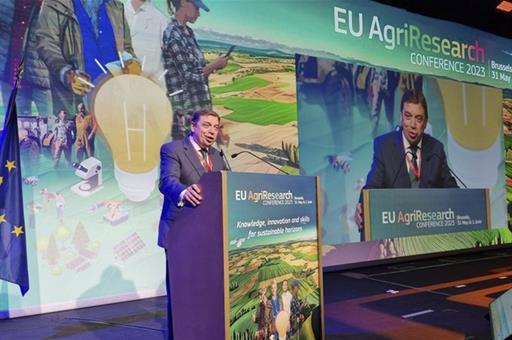Luis Planas: Research and innovation are strategic tools for efficient food production
News - 2023.5.31
The Minister for Agriculture, Fisheries and Food, Luis Planas, has reiterated that research, innovation and the application of new technologies are "essential strategic tools" that will enable more efficient food production, meaning the consumption of fewer resources and the generation of greater added value and a better quality of life in rural areas.
The minister, who spoke today in Brussels at the EU AgriResearch Conference 2023, dedicated to "knowledge, innovation and skills for sustainable horizons", said that boosting and promoting new technologies in the agri-food sector will be one of the priorities of the Spanish Presidency of the EU in the second half of the year, since innovation is key to responding to what he defined as "the main challenge facing the food system on the planet, which is how to produce more food with less consumption of natural resources and in a more sustainable way".
To this effect, the Council of Agriculture Ministers to be held in Cordoba from 3 to 5 September will focus on new technologies as tools for making agriculture more resilient to climate change. The minister affirmed that the EU cannot be left behind in this area in the light of the push from countries such as the US and China.
The minister pointed out that the application of new technologies in agri-food production goes beyond the technologies relating to information and communication and digitalisation to include the development of new genomic techniques that offer the possibility of very precise and controlled gene editing. He cited as an example the development of crop varieties that are more resistant to drought and disease, and have better yields.
The minister expressed his confidence that the European Commission will present its legislative proposal on this matter at the beginning of July, so that during the Spanish presidency an attempt can be made to reach a political agreement on an issue that he considers crucial.
Luis Planas insisted that we must develop knowledge, innovation and technology to adapt agriculture to the consequences of climate change, which have already begun to be felt. He pointed out that they should also contribute to reducing import dependency in the face of unstable political scenarios such as the war in Ukraine, and to optimising opportunities for open strategic autonomy.
The green transition, the minister pointed out, is an urgent and necessary issue that does not respond to ideological questions, and which offers important benefits to society in terms of health, resource savings and employment opportunities, among others. He pointed out that innovation should also contribute to reducing food waste and should take advantage of the benefits of the circular economy. The exchange of knowledge between countries is necessary to improve global food security and the sustainability of the planet, he underlined.
European Innovation Partnerships
The minister also called for a better connection between scientific advances and their application to the real needs of agriculture and business, which is one of the objectives of the European Innovation Partnerships (EIP-Agri). Spain is the second EU country, after Italy, in terms of implementing projects under this strategy, with more than 600 projects financed, for which the Ministry of Agriculture, Fisheries and Food has granted €70.8 million to create 177 operational groups and implement 124 innovative projects.
For the new period 2023-2027, the ministry has increased the budget for the funding of these projects to €75 million, and the first call for proposals will be launched soon. For Spain as a whole, and including the actions programmed by the autonomous communities, the budget will amount to €168 million, an amount that will enable more than 800 innovative projects to be supported.
The conference, organised by the European Commission's Directorate-General for Agriculture, brings together institutional representatives, scientists, farmers, livestock farmers, rural communities, industry, consultants, policy makers and NGO representatives to exchange views on achievements and challenges for research and innovation in agriculture, forestry and rural development.
Bilateral meetings
The minister previously held meetings with the European Parliament's rapporteur on the "Geographical Indications" dossier, Paolo de Castro, and with Sweden's Minister for Rural Affairs, Peter Kullgren. Sweden is the country holding the Presidency of the Council of the EU for the current six-month period.
The regulation on Geographical Indications will be one of the dossiers on which the Council and the European Parliament will try to reach an interinstitutional agreement during the Spanish Presidency in the second half of the year.
Spain has previously led the "Friends of Geographical Indications" group, which has the support of 15 Member States and is based on respect for the models in Mediterranean countries, and which, among other aspects, plans to strengthen the role of producer groups (in Spain it is the regulatory councils that are responsible in this regard).
It is precisely during the Swedish Presidency of the EU, which terminates at the end of June, that the first trilogue meeting (between the Council, the European Parliament and the Commission) will take place on 6 June. Another trilateral meeting is scheduled for 18 July, during the Spanish semester. Luis Planas and Peter Kullgren have begun the "handover" of some of the issues that will run over to the six months of the Spanish Presidency.
Luis Planas considered the outcome of the meeting of the Council of Agriculture Ministers held yesterday in Brussels, and the bilateral meeting he held with the Commissioner, as a step forward in unblocking the use of funds from the crisis reserve to support farmers and stockbreeders vis-à-vis the drought. The minister pointed out that the requests made by Spain and Portugal and endorsed by France and Italy received majority support, and that their structure will be finalised in the coming weeks.
Non official translation





